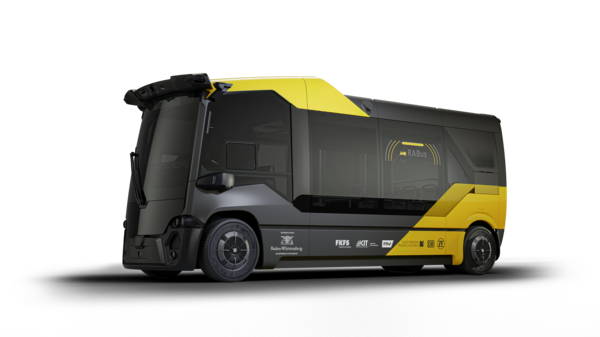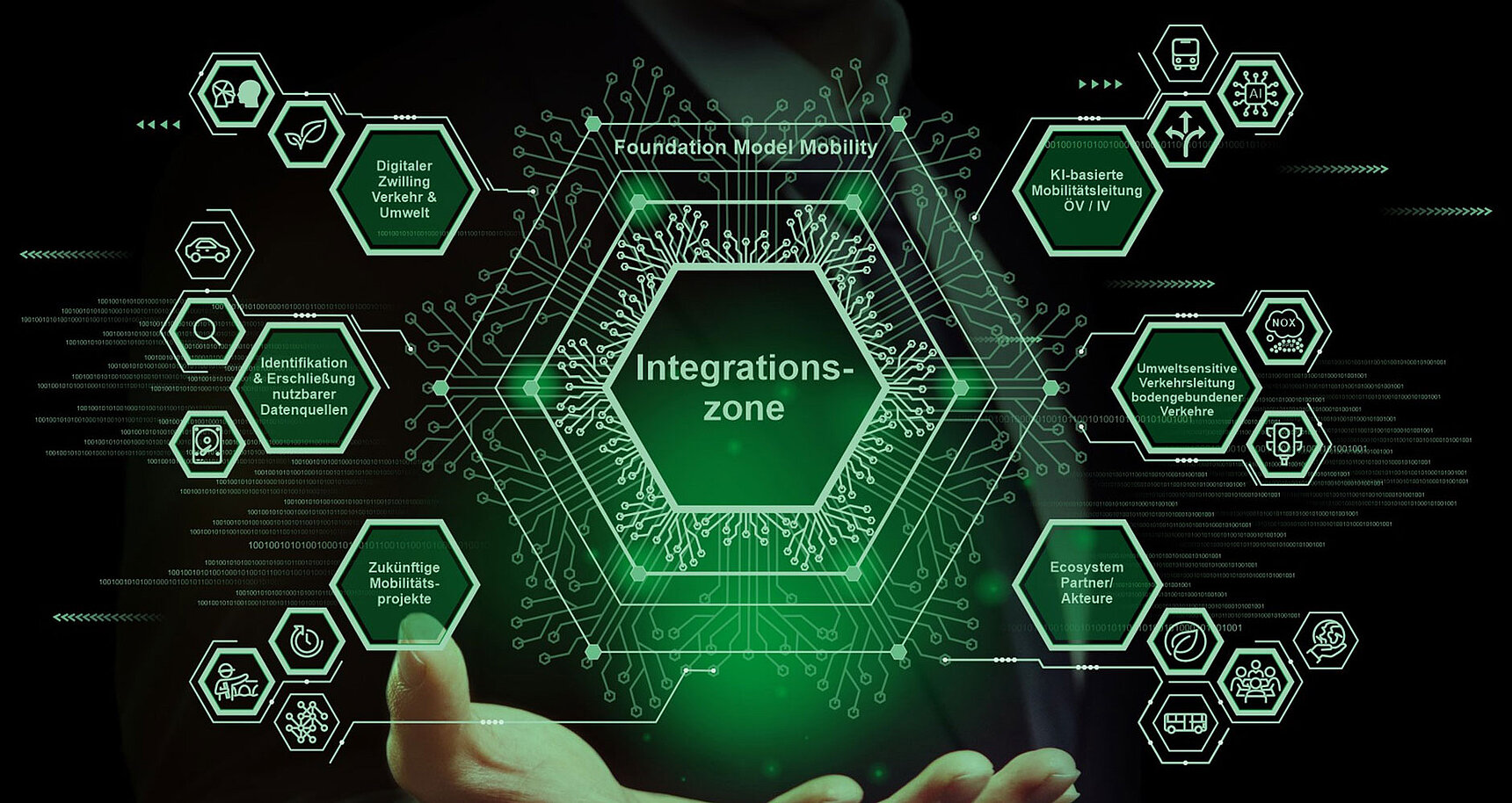Our projects
FKFS is involved in many projects publicly funded by the federal or state governments, often in a lead role.
Here, you may find a small selection of our current projects.
U-Shift
Project U-Shift - Modular vehicle concept for autonomous, driverless electric driving
Innovative modular vehicle concept for the change in urban mobility and logistics: As a consortium partner, FKFS is responsible, among other things, for the central electric drive components, the holistic energy and thermal management and the central driving function intelligence (motion control).
The project is funded by the Ministry of Economics, Labour and Housing in Baden-Württemberg as part of the Automotive Industry Strategy Dialogue.

Image: DLR
Contact
Ph.: +49 711 685-65701
Ph.: +49 711 685-65600
For more information on the project, see our U-Shift press box U-Shift (only availabe in German).
AI Data Tooling
Project AI Data Tooling
The publicly funded AI Data Tooling project enabled us to expand our portfolio of methods and tools for generating highly realistic synthetic data for training AI algorithms for automated driving functions. The consortium, led by BMW and including FKFS, comprised 17 partners from industry and science and was funded by the Federal Ministry for Economic Affairs and Climate Protection.
The toolchain developed in the project can be used to generate realistic simulations with multimodal camera, lidar and radar sensor sets. A multi-simulation handler for the configuration of co-simulations, which can be used to link a wide range of tools for data generation, was developed at FKFS. We rely on standardized formats such as OpenSCENARIO, OpenDRIVE, OSI, etc. In particular, FKFS examined the influence of driving dynamics on sensor technology and the generation of realistic traffic scenarios.
Another focus of FKFS was on the implementation of a real-time capable toolchain for use in the Stuttgart driving simulator, in which driver-in-the-loop simulations can be carried out. The results of the AI Data Tooling project represent significant progress for us in realistic driving simulation and the application of neural networks with a focus on automated driving.



Contact
Ph.: +49 711 685-69461
RABus
Project RABus - Real Laboratory for Automated Bus Operation in public transport in urban and rural areas

The RABus project was implemented in Baden-Württemberg over a period of 4.5 years and has been successfully completed. Its objective was to integrate highly automated, electrically powered vehicles into regular public transport operations under real traffic conditions.
Testing took place in two distinct traffic environments: an urban setting in Mannheim and a corridor with a pronounced urban–rural character in Friedrichshafen. The automated shuttle vehicles were integrated into mixed traffic and operated both within city areas and on interurban routes. During the course of the project, speeds of up to 53 km/h were achieved and systematically evaluated in real-world operation. RABus therefore went significantly beyond typical low-speed demonstration projects.
In parallel with technical and operational deployment, extensive real-world data were collected. As part of 430 test runs, more than 1,600 participants were transported, covering a total of 2,100 kilometres in automated operation on public roads. 99 percent of the trips were completed as scheduled — including under conditions of rain, fog and dense traffic. Accompanying surveys indicate a high level of societal acceptance: 93 percent of participants stated that they felt safe during the ride. Furthermore, the proportion of individuals expressing reservations about automated driving was reduced by half after their personal experience. These results provide robust evidence regarding technical performance, operational stability and user acceptance under real traffic conditions.
Beyond practical testing, technical capability, operational robustness, regulatory frameworks and economic aspects were systematically analysed. The FKFS was responsible for technical system analysis, safety assessments and the evaluation of operational and economic data, including regulatory considerations. Based on these technical, regulatory and economic analyses, conclusions were drawn regarding transferability to further deployment areas within Baden-Württemberg, and concrete recommendations for action were formulated.
The consortium comprised the Research Institute of Automotive Engineering and Vehicle Engines Stuttgart (FKFS), Stadtverkehr Friedrichshafen (SVF), Regionalverkehr Alb-Bodensee (RAB), Rhein-Neckar-Verkehr GmbH (rnv), the Institute for Transport Studies (IfV) at the Karlsruhe Institute of Technology (KIT), and ZF Friedrichshafen AG. The close collaboration between research institutions, industry and public transport operators enabled implementation within regular passenger service.
Contact
Ph.: +49 711 685-68524
Final Reports (only available in German)
Additional Documents (only available in German)
AIAMO
AIAMO - Artificial Intelligence And Mobility
AIAMO is a project funded by the German Federal Ministry of Digital and Transport. Under the consortium leadership of ITS Germany e.V., 12 partners are working together to develop AI-based environmental and mobility management in order to make mobility more efficient, resource-saving, safe and demand-oriented.
Mobility participants generate a wealth of data that often remains unused. In AIAMO, FKFS focuses on three main areas: data acquisition, digital twins and data augmentation. We develop model- and data-based software to refine the collected data and generate new data and insights from it. The work includes the development of a model each for tire, brake and car-following and the calibration of these models. As a first step, the current traffic and the resulting emissions will be measured in selected regions and used to parameterize the models. On this basis, the software should be able to be used for forecasts in order to quantify the influence of infrastructure changes and new types of connected driving functions (e.g. GLOSA).
Date augmentation deals with the generation of data when there is too little or no data available in terms of space and time. Using artificial intelligence and historical data, complex correlations can be learned and then generated at the push of a button. As with model-based forecasting mentioned above, we at FKFS focus on data-based forecasting. In addition, we are developing data augmentation methods to expand existing data sets and thus increase the data base.

Contact
Ph.: +49 711 685-68131
SALSA
Smarte, Adaptive und Lernbare Systeme für Alle (translates to: smart, adaptive and learning systems for all)
SALSA is being developed by a consortium of 16 partners funded by the Federal Ministry of Economics and Climate Protection (BMWK).
In the near future, automated, autonomous and conventional vehicles will coexist in road traffic and share space with pedestrians, cyclists and other vehicle variants. However, lack of interaction, non-standardized communication and implausible driving behavior could lead to difficult situations and lower acceptance of these technologies.
SALSA aims to overcome these challenges by building the bridge from vehicles to other road users and from vehicle occupants to technology.
The focus of FKFS in SALSA is on driving behavior in mixed traffic. Our aim is to give passengers a high level of confidence in the vehicle systems to ensure a safe and confident driving experience. At the same time, driving behavior should be cooperative and predictable for other road users.
In the project, the highly immersive Stuttgart driving simulator will be used to study driving behavior. With its help we are going to conduct several studies with test subjects. As the Stuttgart driving simulator can realistically reproduce vehicle movements as well as the visual and acoustic vehicle environment, it is very well suited for investigating with test subjects in defined driving situations, how they react or what driving behavior they would like from a vehicle. Further advantages of the driving simulator are the ability to reproduce defined situations and the driving behavior of autonomous vehicles. In real road traffic, such investigations are not yet possible and would only be feasible at great expense.
In SALSA, an initial study is being conducted at FKFS using an existing mock-up, a compact car, to investigate driving behavior during manual driving. For this purpose, especially critical traffic scenarios, in which a driver deliberately wants to override an assistance system, are going to be reproduced. The aim of this study is to identify characteristics by which a driver's intention can be recognized so that an assistance system does not unintentionally intervene in vehicle control.
Another project of FKFS within SALSA is the development of a new vehicle mockup, a minibus, for user-experience studies. This new mockup is designed in particular for topics relating to autonomous driving with SAE level 4. With this new UX mockup, FKFS is going to investigate how different occupants would like an autonomous vehicle to behave in different situations. In addition to driving behavior in everyday driving situations, another focus is on driving behavior in extreme situations, so-called minimum risk maneuvers, in which the autonomous vehicle has to perform an emergency stop. Even in these exceptional situations, occupants should always feel a high level of safety. In the Stuttgart driving simulator, it will be investigated how the driving behavior of an autonomous vehicle can contribute to the occupants feeling safe.

Contact
Ph.: +49 711 685-69461




